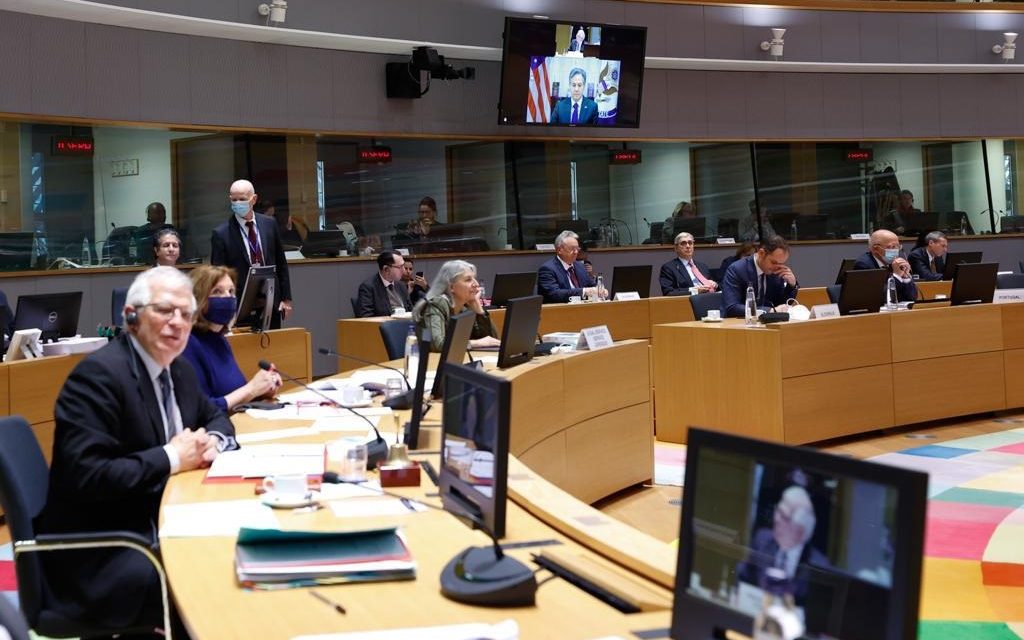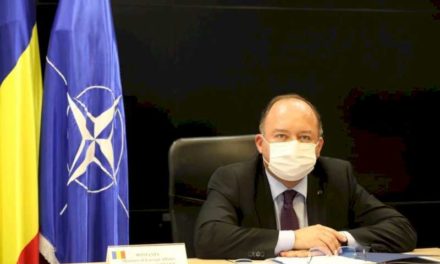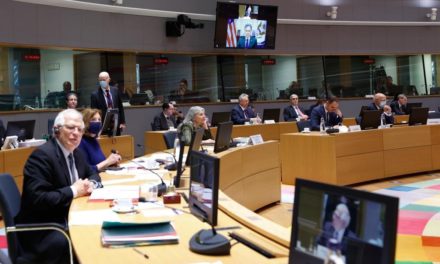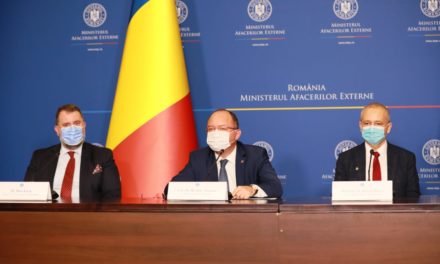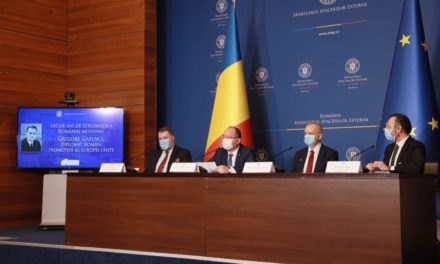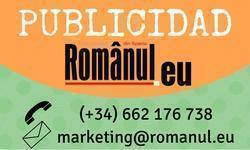Transcript:
Stuart Greer: Minister Bogdan Aurescu is joining us here, in Prague. I have to start with visas and a proposal by some of your EU colleagues to ban tourist visas for Russian citizens. What is your position on that? Should the EU place further limits on Russians or introduce the blanket ban?
Bogdan Aurescu: Well, this is one of the main topics which are going to be discussed, I think, tomorrow, because today we will start with the EU-Africa relations during our meeting of the Foreign Ministers of the EU – the Gymnich meeting. And tomorrow I will explain, I will express the position of Romania, in the sense that we support the suspension of the Visa Facilitation Agreement with Russia, because a Visa Facilitation Agreement is in fact a document which should come along with a certain state of affairs in the relationship between the EU and the respective country. And I think the accounts say that the Russian Federation is not respecting fully the provisions of the Visa Facilitation Agreement. At the same time, we have to be aware of the fact that Russia has put basically all Member States on the list of “unfriendly” states. So I don’t think the environment between the EU and Russia is currently corresponding to the purpose of a Visa Facilitation Agreement. On the other hand, on the issue of the suspension of visas for Russian citizens, I will express full availably of Romania to discuss about the adoption of further measures for restricting the circulation of Russian citizens in the European Union, because we consider that – especially focusing on visas for tourism – tourism is not a fundamental right. It is something that should be granted also taking into account the current state of affairs between the EU and Russia. And, at the same time, I think it’s important for you to know that since Romania is not yet a member of the Schengen space, we do not issue Schengen visas, but we issue visas bilaterally. Since the beginning of the year, Romania has issued around 800 visas for Russian citizens, out of which around 130 visas were for tourism. So the numbers are not that high, but I think it’s a matter of principle. It’s a political issue. It’s not a technical issue. And we need to discuss it and to see what are the arguments in favor and against, because there were various arguments which were expressed by Member States. It is important also to see what are the views of the Commission, of the External Action Service on this matter, and to decide accordingly. As far as Romania is concerned, as I said, we support the decision on suspending the issuance of visas for tourism, providing that this decision is taken on a solid legal basis, because we need to have a solid legal fundament for such a decision. At the same time, it is also important to allow the issuance of visas for Russian citizens who are dissidents or who are running from the opression, who are threatened by the regime. Many of these citizens are also using tourist visas. We have to be aware of that and we have to take, basically, into account all such situations which represent exceptions, which should not be touched by the decision of suspension: humanitarian visas as well, medical visas, there are also other situations that might be taken and should be taken into account when we take such decisions.
Stuart Greer: So, a blanket ban on tourists, but exceptions for humanitarian cases and dissidents.
Bogdan Aurescu: I think this is – as far as Romania is concerned – the right approach in order, on one hand, to give a very clear political signal, because indeed, quite a large percentage of the Russian society is supporting President Putin’s war of aggression against Ukraine. On the other hand, we have to keep the door open for those who need to be exposed to European values, on one hand, and, on the other hand, to protect those who are opposing the regime in Russia.
Stuart Greer: On energy and the energy crisis – everybody is expecting this winter to be very difficult. Romania is an energy exporter. What capacity does Romania have to boost production and electricity and, possibly, boost exports to help its partners next door?
Bogdan Aurescu: Well, I’m afraid Romania is not yet an export country. We are working on that because we are working on starting the exploitation of our hydrocarbon resources in the Black Sea continental shelf, at the level of the years 2025-2026, and since then, well, perhaps we will also be able to help other partners in coping with the energy crisis. It is true, on the other hand, that Romania is one of the least dependent countries in terms of energy imports from other sources, including from Russia. And we work together with our partners in order to improve the capacity of the European Union to be less dependent on Russia. We will not discuss this matter explicitly during this meeting of the Foreign Ministers, because this is a matter for the Meeting of the Energy Ministers, which will be convened on the 9th of September, if I remember correctly. But this is an important, a very important matter, because what is really relevant if we discuss about the relations between EU and Russia – and this is the main topic on the agenda of the informal Foreign Ministers’ meeting of today and tomorrow – if we speak about the EU-Russia relations, I think the most important issue is to be and to act in order to become less dependent, to become independent of any kind of influence from Russia. Our resilience is, in fact, at stake.
Stuart Greer: Do you see Romania doing more to attract foreign investments to exploit these offshore gas reserves in the Black Sea, for example? Maybe having some sort of tax incentives or cutting red tape to attract foreign investment to exploit these resources?
Bogdan Aurescu: Well, I think maybe you should have an interview with my colleague, the Minister of Energy, who will, no doubt, come to Prague, and will give you more details about our plans, but we do have a plan on this issue and we are trying to move in such a manner as to increase our energy independence. We also want to develop our production of nuclear power – and we have a plan on this, as well, to develop two new reactors at our nuclear power plant in Romania. We have also embarked upon a very ambitious plan to become a hub for the development and production of small modular reactor parts, at the level of 2028-2029, and we hope that in Romania, in that timeframe, will have the first power plant using this new American technology, of small modular reactors.
Stuart Greer: And on the grain and corn exports from Ukraine, a lot of it is going through Romania; what can Romania do to increase the volume that is being shipped through the Black Sea port of Constanța and barges through the Danube as well?
Bogdan Aurescu: I think we have done a lot to increase our capacities. We still have to do more. One has to say that last year there were, basically, no shipments of Ukrainian grain through Romania, because Ukraine was using its own ports, and the Black Sea routes, to the Black Sea straits, and from that to third country destinations. But since the beginning of the war, we have improved our capacity to facilitate the transit of these shipments and, as of the 17th of August, for instance, more than 3.4 million tons of Ukrainian grain have been shipped through Romania, which is more than half of the total of the Ukrainian grain exports during this period. And we continue with this, we have acted in order to facilitate the transit. It’s not just about the Constanța port, but also about the Galați port on the Danube: we have modernized a wide gauge railway connection from the border with Ukraine to the Galați port itself, in order to be able to bring Ukrainian grain directly. You know that there is this issue of difference of gauge of the rail between the former Soviet countries [and European type gauge of the rail], but we have improved our transit capacities. But of course, we need to do more. We count on the functioning of this deal which was reached at the end of July, with the help of the United Nations and Turkey, but again, we have to use, I think, all routes available and Romania is the closest country and provides the closest routes for the export of Ukrainian grain. It’s very important to facilitate this transit, in order to cope with the possible food crisis in countries like Africa or Middle East.
Stuart Greer: On Moldova – the EU promised some military aid for neighboring Moldova back in May. Are you doing anything to convince your colleagues, your counterparts of the EU to provide more aid, military aid, defense aid to Moldova?
Bogdan Aurescu: I think Moldova needs a lot of help, on multiple dimensions, because Moldova is perhaps the most affected neighboring country to Ukraine, as far as the impact of the conflict in Ukraine is concerned. And from that perspective, there is an energy crisis which has to be addressed and we have to help the colleagues in the Republic of Moldova to cope with the issue of supply of energy sources. There is an economic crisis, which is prompted by the conflict itself, the cost of social measures; the loss of certain markets like Belarus, Russia, Ukraine itself, had some consequences. There are also effects regarding the effort of the Moldovan authorities to take care of the refugees. They have the largest number of refugees from Ukraine per capita among the neighboring countries of Ukraine – and Romania was there to help. We have provided humanitarian help to ease the effort of the authorities to take care of the refugees in Moldova itself. We have created the green lane from the Ukrainian – Moldovan border to take directly refugees from that point to the Romanian – Republic of Moldova border, so, you know, not to stay in Moldova, but to bring them to Romania. By the way, Romania has already taken care of more than 2.1 million Ukrainian citizens who crossed our borders, refugees, since the beginning of the war, so this is a huge effort that I think we have managed quite decently. And we have provided financial assistance. I think it’s very important for all EU Member States to provide direct financial assistance to the Republic of Moldova, they need grants in order to cope with the economic situation. And one important instrument that we have created, together with Germany and France, was the Moldova Support Platform. The Moldova Support Platform is an instrument created at the beginning of April in Berlin – the launching conference took place in Berlin, and the purpose was to attract financial assistance. In Berlin, we managed to collect around 660 million euros for the Republic of Moldova. And then we had another conference, a second one, a follow-up conference in Bucharest, on the 15th of July, and we were able to collect another 615 million euros, out of which 432 million euros grants – so, direct assistance, which is very much needed, again, for supporting the economy of the Republic of Moldova. At the same time, we have used this Platform also as a tool to support reforms in Moldova, because now Moldova is a candidate for accession to the European Union. This is an objective that we have supported a lot and we are very glad that Moldova succeeded to get this status of candidate country to the European Union. But being a candidate country means that you have to perform a lot of reforms – reforms regarding the public administration, the justice system, the fight against corruption. There are benchmarks which were included in the Opinion of the Commission of the 17th of June, which recommended the decision for granting candidate status, – and those benchmarks need to be followed. So we need to help the Republic of Moldova to perform this set of very difficult reforms. The Platform is providing a number of working groups on very important aspects which are connected to this reform effort. During the Conference in Bucharest, we have created a 6th working group dealing with the reform of public administration and the management of public finances – which are included as benchmarks in the 17th of June Opinion of the European Commission. So, a multidimensional effort to support Moldova. This also includes the defense capacities of the Republic of Moldova. There is already a decision taken to provide 40 million euros from the European Peace Facility to the Republic of Moldova for improving its defense capacities. The NATO Summit in Madrid also decided to provide assistance, to provide a package of support for the defense capacities of the Republic of Moldova – we have supported that. So we are a part of all this effort of the EU and NATO in terms of improving the capacities of the Republic of Moldova.
Stuart Greer: Minister, thank you very much for joining us today.
Bogdan Aurescu: Well, thank you so much.
Sursa: Interviul ministrului afacerilor externe Bogdan Aurescu pentru postul Radio Europa Liberă

